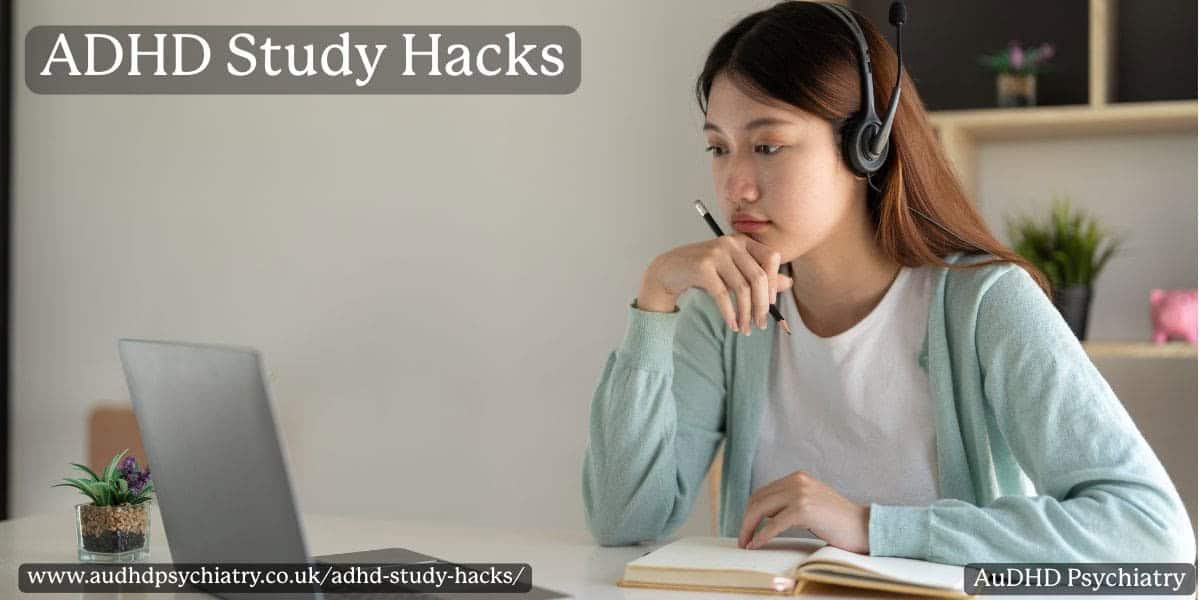
Can’t sit still long enough to study? You are not the problem. Your study method might be.
The most effective ADHD study hacks are the ones that work with your brain. These can include using short, focused sessions, movement-based techniques, visual aids, and smart tools to help you retain information without burning out.
If traditional study advice has never worked for you, this guide will change that. Courtesy of our Scotland ADHD psychologists, show you how to stay focused, structure your time, and use practical tools that improve memory and motivation without forcing yourself to sit for hours.
If you’re preparing for exams, revising coursework, or managing deadlines, these ADHD-friendly tips are backed by research and proven by experience. You’ll learn how to reduce overwhelm, manage distractions, and build a consistent routine that works for your brain.
Understanding ADHD and Study Challenges
Overview of ADHD
Attention Deficit Hyperactivity Disorder (ADHD) is a neurodevelopmental condition that affects focus, impulse control, motivation, and memory. It’s not just a childhood issue. Adult ADHD is common and can impact daily life well into your education or career.
When it comes to studying, ADHD doesn’t mean you’re lazy or incapable. It means your brain processes information differently. You may need extra time, more structure, or different sensory input than your peers.
How ADHD Affects Studying
Students with ADHD often struggle with:
- Focus and attention – drifting off mid-task or jumping between ideas
- Short- and long-term memory – forgetting material even after reading it several times
- Task completion – starting strong but losing momentum before finishing
- Time blindness – underestimating how long a task will take or losing track of study time
These challenges can make even simple assignments feel like large tasks, leading to frustration or burnout.
Common Learning Barriers
Here are some barriers many ADHD students face during study sessions:
- Brain fog – when your thoughts feel fuzzy and nothing sticks
- Procrastination – not because of laziness, but due to task paralysis or overwhelm
- Disorganisation – losing notes, missing deadlines, or forgetting instructions
- Perfectionism – delaying work because it feels impossible to get it “right”
If you’ve tried the usual tips for students and still feel stuck, it’s not a reflection of your ability. It’s a sign you need a new approach. The next section breaks down ADHD study hacks designed to work with your brain, and not against it.
ADHD Study Hacks That Actually Work
The best ADHD study tips are ones that fit how your brain works. That means ditching rigid routines in favour of flexible, interactive strategies that make study time easier to manage and more effective. Here are evidence-informed hacks that actually help students with ADHD stay focused and retain information.
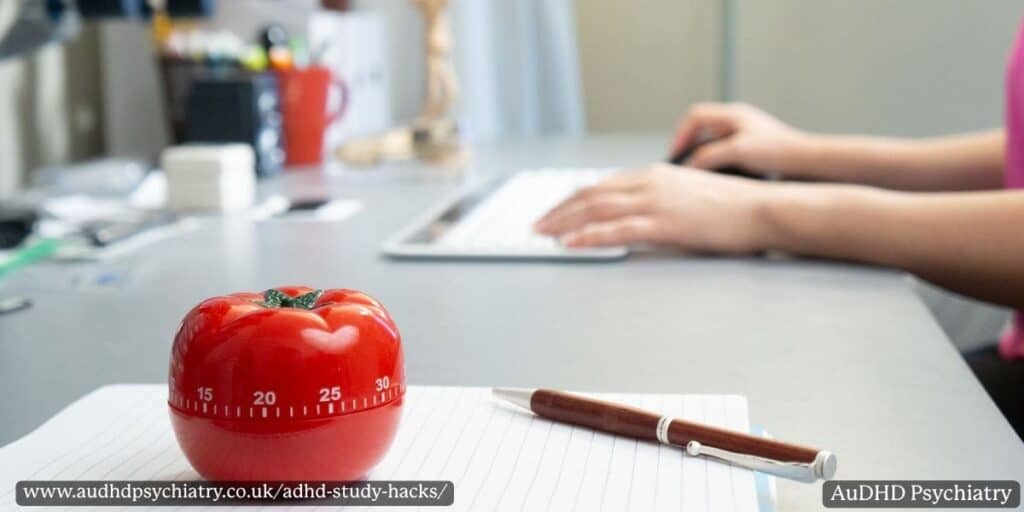
Use the Pomodoro Technique (With Tweaks)
The Pomodoro method involves 25-minute study sessions followed by short breaks. For ADHD brains, that might be too long, so try:
- 15 minutes on, 5 minutes off
- Use a visual countdown timer
- Take breaks involving movement, like stretching or walking
Mix Learning Styles
People with ADHD often learn best through variety. Use a mix of:
- Visual tools – mind maps, diagrams, flashcards
- Auditory tools – reading aloud, podcasts, recorded notes
- Kinaesthetic tools – rewriting notes, building models, walking while reviewing
Teach What You Learn
One of the fastest ways to boost long-term memory is to teach the information to someone else. This method, also known as the Feynman Technique, helps you spot gaps in your understanding.
Engage With the Material
Passive reading won’t cut it. Instead:
- Annotate as you read
- Summarise key ideas in your own words
- Self-quiz regularly to reinforce memory
Get Creative
Try these brain-friendly strategies:
- Turn information into stories, metaphors, or analogies
- Use fidget tools to stay focused during reading
- Stimulate your senses: light a scented candle, play lo-fi music, adjust your lighting
Make Studying Fun
- Gamify study time using apps, checklists, or points
- Use spaced repetition tools like Anki or Quizlet
- Study with a body double: someone who works beside you for accountability
These ADHD study hacks help you focus without forcing your brain into someone else’s routine. Instead, you’ll build habits that feel natural, sustainable, and genuinely helpful.
ADHD Study Environment Hacks
Your environment plays an important role in how productive your study sessions feel. For students with ADHD, the right physical setup can reduce distractions and improve focus without relying on willpower alone.
Declutter Your Space
Too much visual clutter can overwhelm your brain before you even begin. Try:
- Keeping only the essentials on your desk
- Using trays or drawers to store materials out of sight
- Creating a designated “study zone” away from your bed or high-traffic areas
Even a small shift in surroundings can make study time feel more intentional.
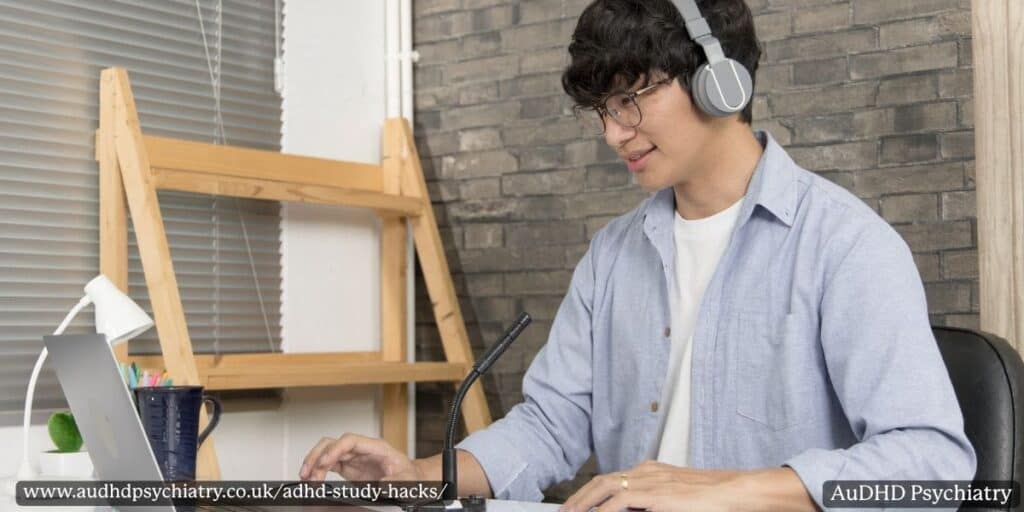
Use Ambient Sound or Block It Out
Some ADHD learners benefit from low-level noise. Others need silence. Test both and try:
- Lo-fi music, rain sounds, or nature tracks
- Noise-cancelling headphones or earplugs
- Apps like Noisli or myNoise to create a calming background
Add Sensory Cues
Your brain responds to environmental signals. Use sensory anchors to tell your brain it’s time to study:
- Lighting – adjust brightness or use a desk lamp
- Scent – use essential oils or candles to associate a smell with productivity
- Touch – sit on a textured cushion or hold a grounding object while working
Make Visuals Work for You
If you think in pictures, try:
- A wall-mounted whiteboard to plan out tasks
- Sticky notes for breaking down large goals
- Colour-coded visual checklists to track progress
The goal is to reduce overwhelm while helping your brain stay engaged. A few simple tweaks can make studying less stressful and more productive.
Digital Tools and Tech Hacks
Studying with ADHD doesn’t always require more discipline. It requires better systems. When used thoughtfully, technology can support your focus, reduce distractions, and help you follow through on study goals without exhausting your mental energy.
Use ADHD-Friendly Study Apps
Apps like Notion, Forest, and Focusmate have become popular for good reason. Notion allows you to create personalised dashboards with notes, revision plans, to-do lists, and even motivational widgets, all in one clean interface. Its flexibility is ideal for ADHD users who need both structure and visual freedom.
Forest turns studying into a game by planting a virtual tree that grows as you stay focused. If you leave the app or open a distracting site, the tree dies. For students who need a visual cue to stay off their phones, it can be surprisingly effective.
Focusmate, on the other hand, offers virtual body doubling. You join timed sessions with another person online, and work quietly in tandem. It’s ideal for accountability without social pressure.
Block Digital Distractions
One of the most useful ADHD study tips is to remove digital temptations before they start. Chrome extensions like StayFocusd or LeechBlock let you limit access to certain sites during your study time. You can customise which sites to block and set time limits or schedules.
If you’re sensitive to visual clutter, tools like uBlock Origin help clean up distracting ads or pop-ups, creating a calmer browser experience. These extensions reduce mental load and make it easier to stay on task once you’ve started.
Record Thoughts or Use Speech-to-Text
Not every student with ADHD learns best through writing. If typing slows you down or interrupts your thinking, consider using audio notes or speech-to-text tools. Recording your thoughts verbally helps you capture ideas quickly, especially if your brain moves faster than your hands.
Apps like Otter.ai and Google Docs voice typing convert your speech into editable text, making it easier to review and revise later. You can also listen back to your recordings during a walk, turning passive moments into bonus study sessions.
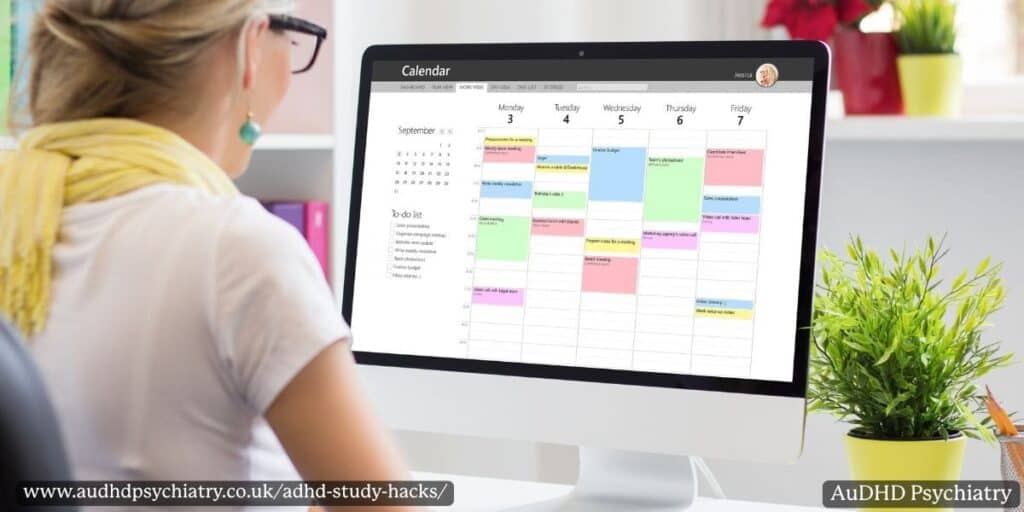
Set Reminders and Use Digital Planners
With ADHD, relying on memory to manage your schedule can be unreliable. Digital planners like Todoist, TickTick, or Google Calendar give you visual, scheduled reminders that reduce executive strain.
You can set recurring study blocks, colour-code tasks by subject, and create alerts that prompt you to begin, even when motivation is low. These tools help you build consistent routines without overthinking what comes next.
The right tech doesn’t just help you study. It gives your brain a break from having to remember and control everything on its own.
Focus Techniques to Minimise Distractions
Staying focused with ADHD isn’t just about willpower—it’s about using the right techniques that guide your brain back to the task. Distractions are everywhere, but with a few practical changes, you can train your environment and habits to support sustained attention during study time.
Use Physical Anchors
One of the simplest ways to improve focus is to give your brain a cue that it’s time to work. Try wearing a “study hoodie” or sitting in a specific chair only during study sessions. These physical anchors become associated with focus, helping your ADHD brain transition more easily into task mode.
You can also use a grounding object like a stress ball, textured fidget, or weighted lap pad. These help regulate sensory input while keeping your hands busy without pulling your attention away from your notes or screen.
Use Task Bracketing
Instead of tackling a task cold, sandwich it between two things you enjoy:
- Before: A short dopamine-boosting activity (music, coffee, stretch)
- During: The actual study task (e.g. flashcards or reading)
- After: A reward (snack, short walk, 5-minute YouTube video)
This technique lowers resistance and makes it easier to start, especially if you struggle with procrastination or task initiation.
Set Boundaries for Study Time
Your brain needs clear signals about when it’s time to work and when it’s okay to relax. Instead of attempting long, vague sessions, set a visible timer and define your focus window. Even 10 or 15 minutes of uninterrupted work is a win. Using headphones, silencing your phone, or turning off unnecessary browser tabs helps create a mini “bubble” where your attention is protected.
For those wondering how to focus with ADHD without becoming overwhelmed, this boundary-setting technique can be useful.
Expect Distractions, But Have a Plan
Even with all the right tools, your attention might still drift. That’s normal. When it happens:
- Don’t criticise yourself; ust notice the distraction
- Jot it down on a “later” list if it’s a thought or idea
- Gently bring your attention back to the task
Learning how to focus with ADHD isn’t about perfection or being 100% laser-focused. It’s about improving your recovery time when you do get off track.
Study Habits for Better Retention
ADHD-friendly study methods aren’t all about working harder. They’re more about working smarter. These study habits can help you retain more information, reduce overwhelm, and build confidence in your learning process.
Watch and Rewatch (at Your Speed)
Videos are a great alternative to heavy reading. They offer visual and auditory learning in one go, which works well for many ADHD learners. Speed up videos to 1.25x or 1.5x to keep your brain engaged. Just make sure you can still follow the content. Pause and take notes if something feels important or confusing.
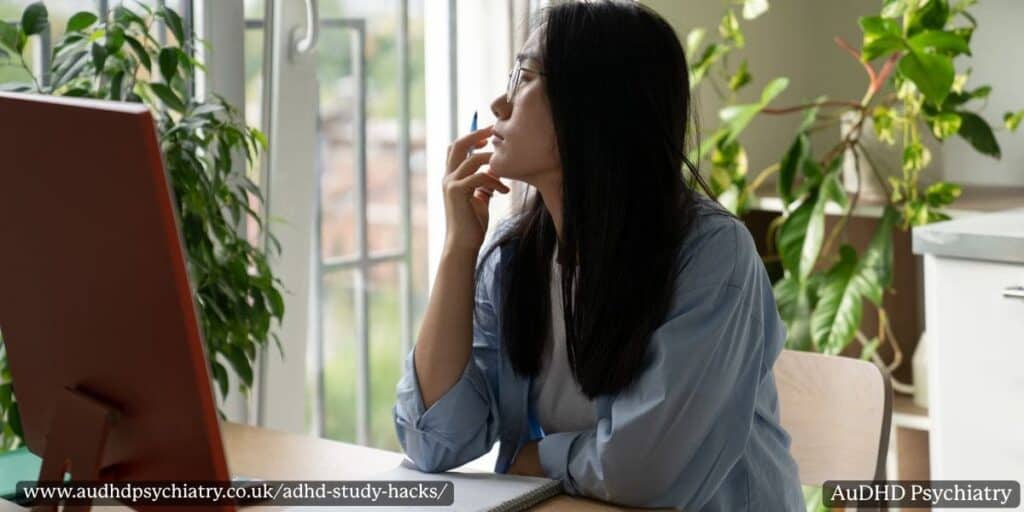
Take Reset Breaks
Breaks aren’t supposed to be just a bonus. They’re essential. Whether it’s five minutes to stretch, drink water, or step outside, physical movement helps your brain reset and prepare for the next round of focus.
Try alternating:
- Movement breaks (jumping jacks, pacing)
- Sensory breaks (scented lotion, music)
- Visual breaks (look out a window or change lighting)
These resets protect your focus and prevent cognitive fatigue.
Notice the Little Things
It’s easy to overlook small mistakes or inconsistencies during study, especially with ADHD. Train yourself to slow down and check your work.
Re-read questions carefully, review answers before moving on, or use colour-coded notes to highlight tricky areas. Being more aware of patterns in your errors can help you study more effectively and avoid repeating them later.
Don’t Compare; Customise.
Your study method doesn’t need to look like anyone else’s. If you need to pace while revising or rewriting your notes five times, that’s okay. Comparison often leads to frustration. Instead, ask: What actually helps me learn this material?
Let Curiosity Lead
If you have a choice in your study topics or order, follow what sparks your interest first. ADHD brains respond well to novelty and dopamine-rich tasks. Starting with something interesting can help you build momentum for harder or less exciting material later.
Lifestyle Tips for Studying with ADHD
Studying well starts with living well. ADHD affects more than just focus. It impacts energy, memory, and stress. These lifestyle tips are simple but powerful ways to support your brain while you learn.
Sleep Isn’t Optional
Sleep is one of the most important study tools you have. It consolidates memory, sharpens focus, and improves emotional regulation. Adults with ADHD are more likely to have irregular sleep patterns, so try:
- Keeping a consistent bedtime and wake-up time
- Avoiding screens at least 30 minutes before bed
- Using sleep sounds or white noise if your mind races at night
Better sleep often leads to better study performance with less effort.
Move Your Body
Exercise isn’t just good for your health. It helps with studying too. Physical activity boosts dopamine, reduces restlessness, and increases mental clarity. You don’t need a full workout to feel the benefits.
You can go for a brisk walk before studying, do 10 squats or stretches during your break, or try gentle yoga to calm nerves before exams. Even 5–10 minutes of movement can have a noticeable effect.
Protect Your Energy
ADHD brains burn through mental energy faster. To avoid burnout:
- Schedule breaks just like you schedule study sessions
- Take a full rest day each week
- Don’t overload your to-do list
Recovery is part of the process. It’s not a sign of slacking. A well-rested brain learns better, solves problems faster, and stays on track more easily.
How to Study Through ADHD Brain Fog
Brain fog is one of the most frustrating challenges for students with ADHD. It feels like your thoughts are moving through treacle: slow, fuzzy, and disconnected.
Concentration becomes difficult, memory slips, and even reading a single paragraph can feel impossible. But brain fog isn’t permanent, and there are gentle ways to push through it without forcing your brain to work harder than it needs to.
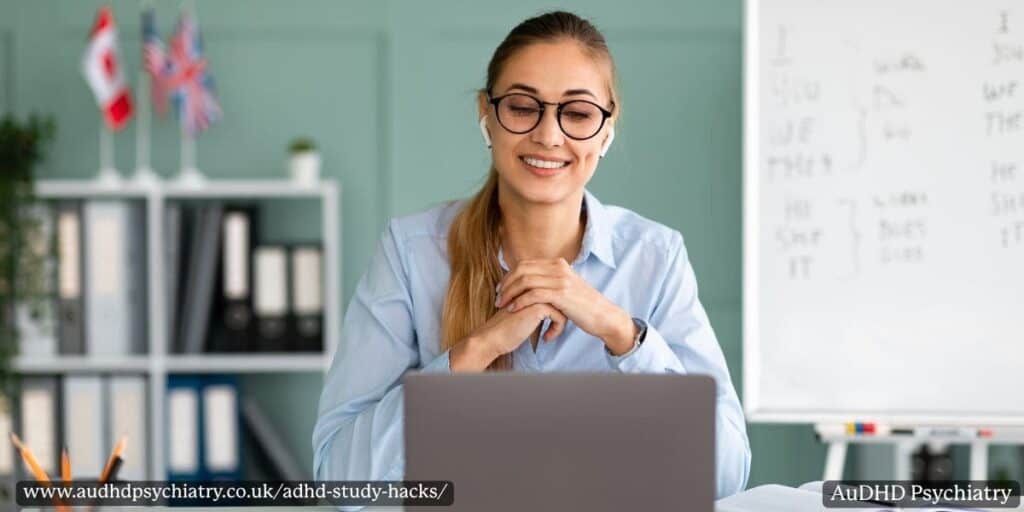
Use Passive Learning
When focus is low, switch to study modes that don’t demand as much active effort. Listening to podcasts, educational audiobooks, or YouTube lectures can still keep your brain engaged without requiring you to sit still or stare at a screen. You can listen while lying down, going for a walk, or tidying your space.
The goal isn’t perfect retention. It’s simply to stay connected to the material.
Short Study Bursts Work Best
Trying to push through a foggy brain with a two-hour study session won’t help. Instead, try very short, focused blocks. Set a timer for 5 to 10 minutes and choose a simple task—reading a paragraph, reviewing one flashcard set, or summarising one topic. Keep your expectations realistic. If it helps, jot down what you completed so you can track your progress.
Reset Your Body, Not Just Your Mind
Sometimes brain fog is your body’s signal to reset. Drink a glass of cold water, open a window, step into sunlight, or move around for a few minutes. A quick change in your environment can help your nervous system re-centre. Deep breathing or grounding exercises can also offer clarity when your thoughts feel scattered.
Most importantly, give yourself permission to slow down. You are not behind. You’re adapting. That flexibility is part of what makes you resilient.
When Studying Feels Impossible
There are days when no tip, tool, or planner will get you started. When every subject feels too big and every task feels too hard. If you’ve hit that wall, it’s important to remember: ADHD is a real challenge, not a personal failure.
Your struggle to study isn’t because you’re lazy or unmotivated. It’s because ADHD affects how your brain manages attention, memory, and emotional regulation. Even on your best days, these things can make learning harder than it is for your peers. On your worst days, they can feel impossible.
You Are Not Alone
Plenty of students, at school, in college, or as adult learners, face this same hurdle. Some find it helpful to follow ADHD creators on TikTok or YouTube who share their routines and setbacks. Others find support in online study groups or through dedicated ADHD coaching support that provides structure and accountability.
Knowing that others have been where you are and made progress anyway can provide real comfort.
It’s Okay to Ask for Help
Sometimes, what you need isn’t another study hack but a human voice. Talk to a trusted friend, message a classmate, or check in with a tutor. If your academic challenges are becoming overwhelming, consider speaking with a specialist who understands ADHD. Professional neurodivergent assessments services can provide the tailored support you need to navigate your study challenges. Asking for help is a strategy, not a weakness.
One Step Still Counts
On the toughest days, lower the bar. Studying for five minutes is still progress. Watching one video, organising your notes, or even just setting up your workspace can be enough. Momentum builds slowly. But even slow movement is movement.
Your brain might work differently, but it is still capable of learning and thriving. Trust that better days will return, and when they do, you’ll be ready.
ADHD Study Hacks: Final Thoughts
Studying with ADHD doesn’t mean following rigid rules or forcing yourself into traditional systems that don’t fit. It means learning how your brain works best, and then building study strategies around that.
From using short Pomodoro sessions and body doubling to creating sensory-friendly spaces and using visual planning tools, there are countless ADHD study hacks that can make learning easier. Whether you thrive on audio notes, interactive apps, or movement-based techniques, the key is to experiment and stay flexible.
What works for someone else might not work for you, and that’s okay. ADHD brains thrive with trial-and-error. The most important part is starting small and noticing what helps. Try one strategy today. If it works, build on it. If it doesn’t, try the next.
If you’re still struggling to study effectively or want expert guidance, we can help. Book a private ADHD assessment with AuDHD Psychiatry and get individualised support that suits your unique needs. Reach out today to get treatment started and receive the right strategies for your needs. For those looking to explore further assessments, you might consider an adult autism diagnosis with BUPA as part of a comprehensive evaluation.
To enhance your study routine, see our tips on How to Take Notes When Your Brain Keeps Wandering.
You Might Also Like
Contact Us
We’re here to answer any questions you might have.
Get in Touch
Opening Hours
Contact Form
We’re here to help. Reach out and we’ll get back to you within 24 hours (Monday – Friday).

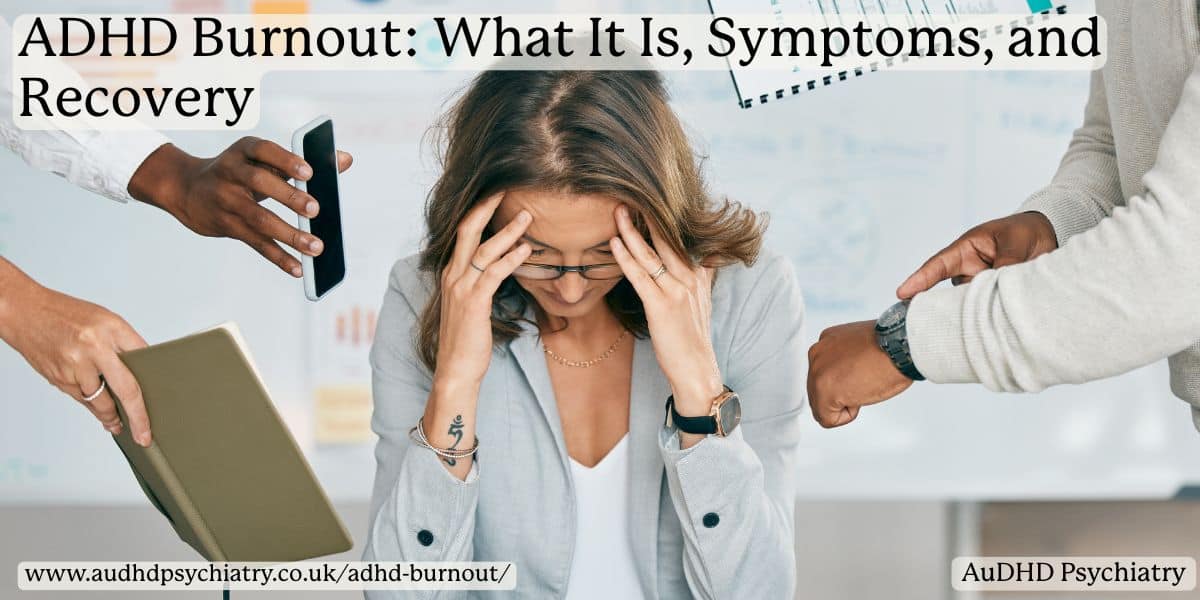
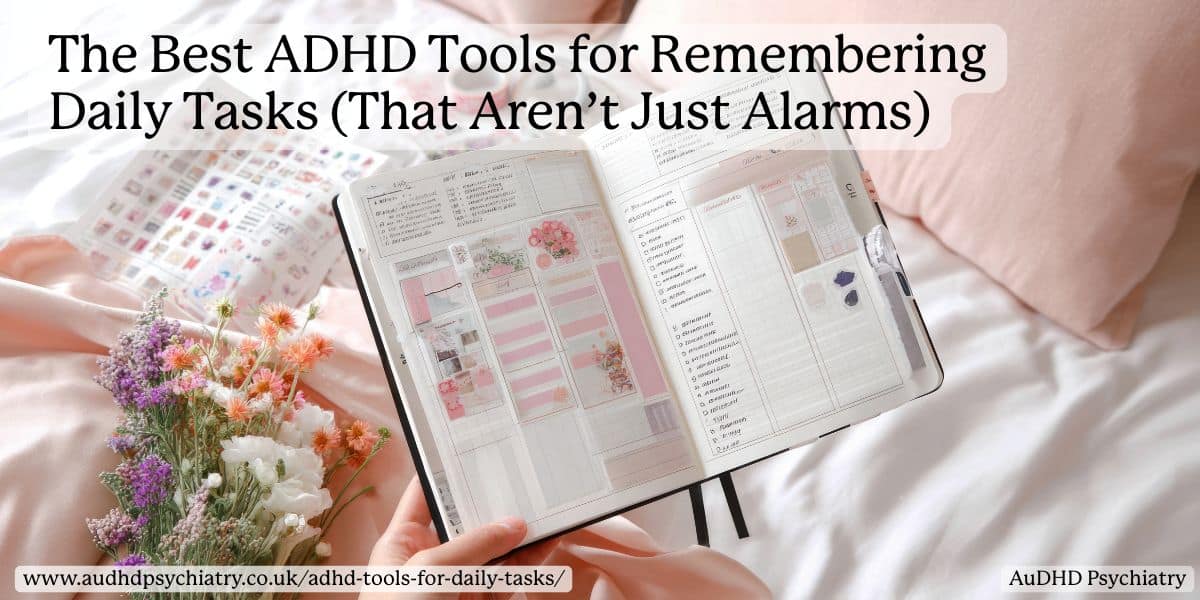
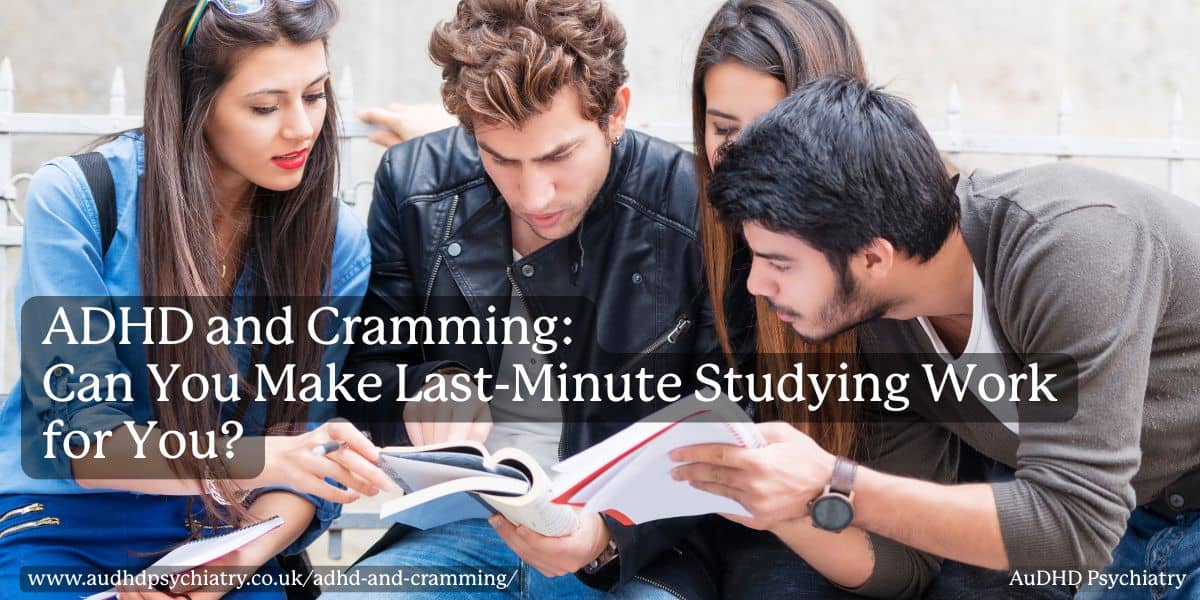
Leave a Reply